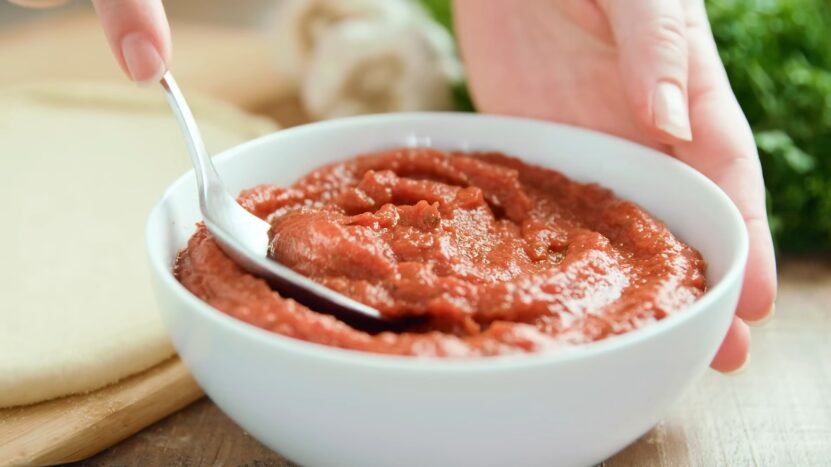We all love Pizza and pasta. They are universally adored dishes, with their roots tracing back to Italy but their fame spanning the globe.
The magic of these dishes often lies in their sauces. They add not only moisture but also infuse the dishes with flavors that elevate them from good to unforgettable.
Composition and Ingredients
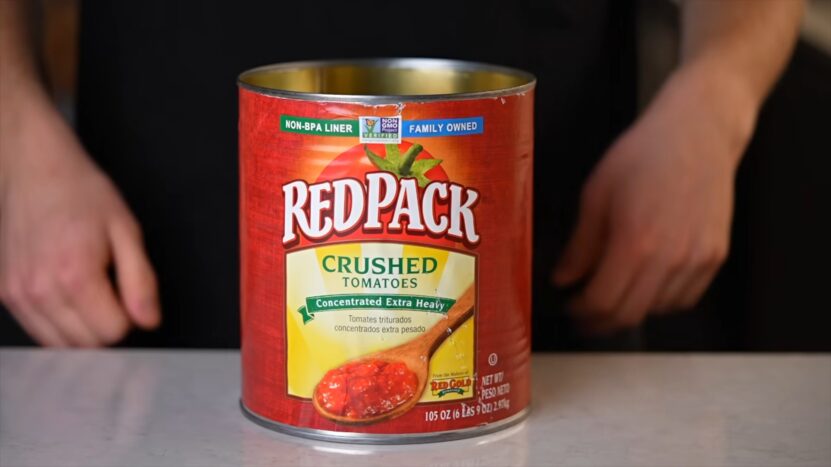
At its core, pizza sauce is a blend of tomatoes, garlic, herbs such as oregano and basil, and olive oil. This mixture is typically kept simple to let the flavors of the pizza toppings shine.
Pasta sauces can be more complex. While they also start with tomatoes and herbs, they often include onions and can even venture into ingredients like olives, peppers, and meats, especially in variations beyond the basic marinara.
Fun Fact: While both use tomatoes, the form can vary. Pizza often has a higher concentration of tomato paste, giving it a thicker consistency. Pasta, especially marinara, can sometimes turn this paste into a “tomato puree” by diluting it with water.
Texture and Consistency
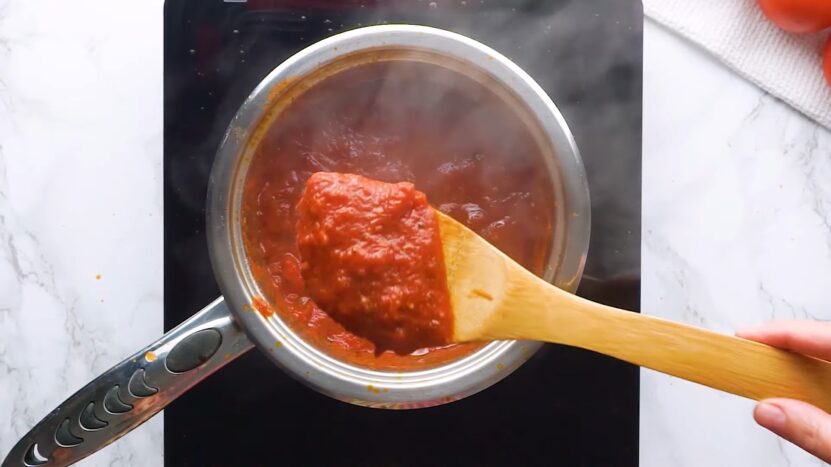
Pizza sauce is typically smoother and more concentrated. This consistency ensures an even spread over the pizza crust, preventing it from getting soggy.
Pasta sauces are often chunkier, providing a hearty texture that clings to the pasta, ensuring every bite is flavorful.
Pro Tip: If you’re thinking of using a pasta sauce on your pizza, remember that its higher water content might make your pizza base a bit soggy!
Flavor Profile
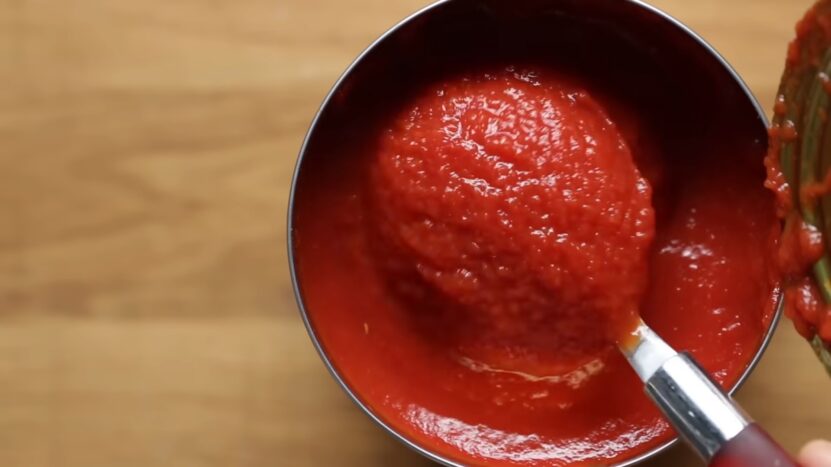
The flavors in pizza sauce are bold and intense. This is to ensure that they stand out against the simple backdrop of dough and cheese.
Pasta sauces offer a balanced flavor profile. They’re designed to meld with and enhance the various ingredients in a pasta dish, from the type of pasta used to the vegetables and proteins added.
Fun Fact: The reason pizza sauce tastes fresher is that it’s usually uncooked before being spread on a pizza. It then cooks along with the pizza in the oven.
Pasta, conversely, is typically cooked and simmered, allowing the flavors to meld before it’s added to cooked pasta.
Cooking Methods
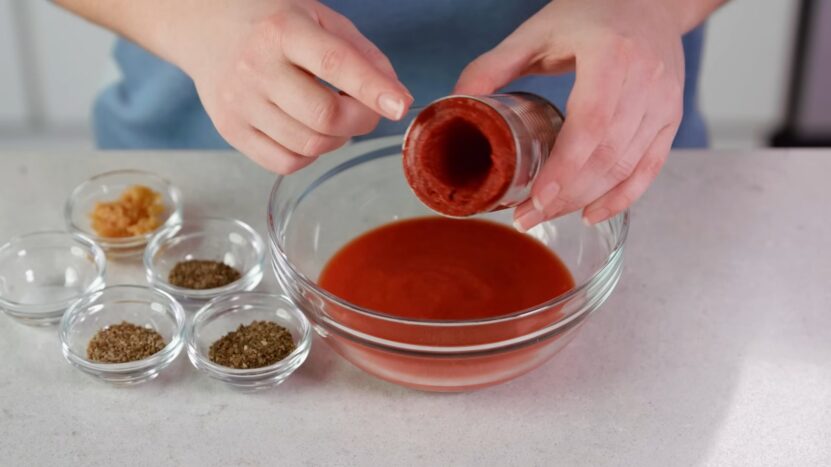
One of the unique aspects of pizza sauce is that it’s typically uncooked when spread onto the pizza dough. This means that it gets cooked only once, which is when the pizza is baked. This method ensures a freshness and vibrant tomato flavor, which is crucial for a delicious pizza.
In contrast, pasta sauces like marinara are pre-cooked and simmered, allowing the flavors to meld and develop over time. This cooking process ensures that by the time it is mixed with cooked pasta, its flavors are rich and well-integrated.
Fun Fact: If you were to put an already-cooked marinara sauce on your pizza before baking, it might affect the quality of the finished product. The sauce could lose its freshness and become overly cooked.
Seasoning and Herbs
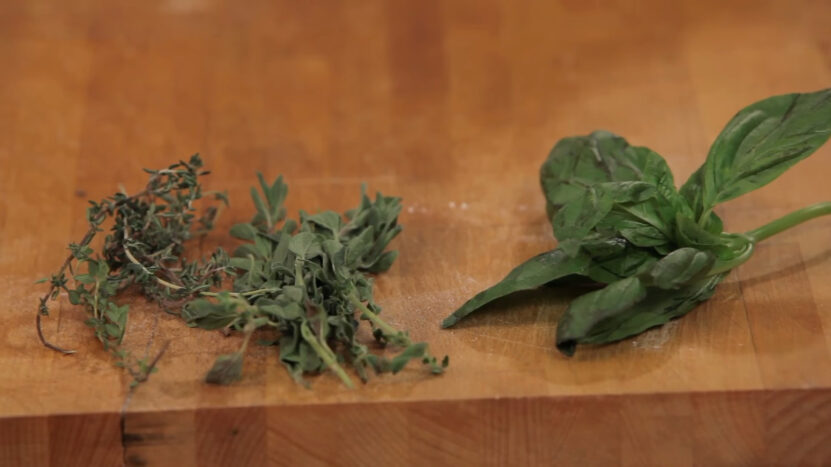
The seasoning in pizza sauce is typically more robust, with a stronger presence of herbs like oregano and basil. These potent flavors are essential to give the pizza its characteristic taste, especially since they spread thin over the dough.
Pasta sauces, while also containing herbs like basil, thyme, and oregano, tend to have a milder flavor profile. This is to ensure harmony with the pasta and any other ingredients in the dish, rather than overpowering them.
Pro Tip: When making pizza at home, consider adding your toppings directly onto the sauce rather than mixing them in. This allows each ingredient to shine and contribute to the overall flavor of the pizza.
Versatility
While pizza sauce is primarily designed for, well, pizzas, its intense flavor and consistency make it suitable for other dishes too. Think of dishes like calzones or even as a dipping for breadsticks.
Pasta sauce is incredibly versatile. Its balanced flavors make it adaptable to various pasta types, from spaghetti to penne. Moreover, it’s not just limited to pasta; dishes like lasagna, casseroles, and even some stews can benefit from a good pasta sauce.
Fun Fact: The versatility goes beyond Italian cuisine. For instance, some people use pasta sauce as a base for Indian curries or even in Mexican dishes like enchiladas.
Pairing with Dishes
As the name suggests, pizza sauce is best suited for pizzas. Its bold and concentrated flavors are designed to complement the simple base of dough and cheese.
However, its versatility doesn’t end there. It’s also a great match for calzones, strombolis, and other Italian bread-based dishes.
Pasta sauce is tailored to complement a wide range of pasta shapes and styles. Whether it’s spaghetti, penne, or fusilli, a good pasta sauce binds the dish together. Beyond pasta, it is also a staple in dishes like lasagna, meatball subs, and even some casseroles.
Pro Tip: When choosing a sauce for your dish, consider the cooking method and the other ingredients. A sauce that pairs well with spaghetti might not be the best choice for a pizza!
Regional Variations
Pizza styles vary greatly depending on the region. For instance, a Neapolitan pizza might have a simple tomato sauce, while a New York-style pizza might opt for a slightly sweeter and thicker one.
Pasta sauces have rich regional variations within Italy. From the garlic and olive oil-based aglio e olio to the meaty Bolognese and the spicy arrabbiata, each region has its signature that reflects its local ingredients and culinary traditions.
Fun Fact: Did you know that marinara, which translates to “sailor’s style,” got its name because it was a quick sauce that sailors could prepare easily after a long day at sea?
FAQ
Are there any health benefits associated with these sauces?
Both when made with fresh ingredients, can offer health benefits. Tomatoes, a primary ingredient, are rich in lycopene, an antioxidant. Olive oil, often used, contains healthy fats. However, it’s always good to be mindful of added sugars or sodium.
Can I store leftover pizza or pasta sauce, and how long will it last in the fridge?
Yes, you can store them in an airtight container. Typically, they can last in the refrigerator for up to 5-7 days. For longer storage, consider freezing them.
Can I use other types of oils instead of olive oil?
While olive oil is traditional and adds a distinct flavor, you can experiment with other oils like avocado or grapeseed oil. However, the taste and consistency might vary slightly.
Are there vegan or gluten-free versions?
Absolutely! Most basic pizza and pasta sauces are naturally vegan and gluten-free. However, always check labels or ask at restaurants, especially if it contains additives or thickeners.
Wrapping Up
Pizza and pasta sauces, while both rooted in the rich culinary tradition of Italy, have distinct characteristics that make them unique. From their ingredients and cooking methods to their regional variations, they play a pivotal role in defining the character of the dishes they accompany.
Whether you’re a fan of the bold and intense flavors of pizza sauce or the rich and complex profiles of pasta sauces, one thing’s for sure: a good sauce can elevate a dish from ordinary to extraordinary.
So, the next time you’re enjoying a slice of pizza or a plate of pasta, take a moment to appreciate the sauce – it’s the unsung hero of Italian cuisine!
